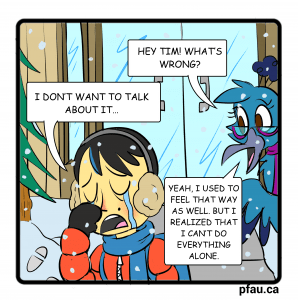We interviewed Kristopher Morrison (Eagle Calling Man), an indigenous and men’s health advocate in Ontario, about men’s mental health. Men and women have been socialized differently around emotions, communication styles, and dealing with life’s problems. Research has shown that men and women express depressive symptoms differently, for example. Women tend to emote and talk about their feelings, while men tend to pull inward and isolate themselves. It is unclear if their differences are biological or social, but they exist. And, this kind of self-isolating response to stress, especially emotional stress, can make it even more challenging for men to reach out for support than women when they need it the most.

_
Kris was born in the Swamping Cree Territory, with a deeper connection to the Cree Territory. Kris continues to cultivate a connection to the land through spending time outdoors hunting, fishing, and trapping. While in Peterborough, Ontario, he employs his traditional and cultural knowledge and practices to teach leadership skills and build confidence in the community, with a special focus on changing how we view and cultivate male leadership. He believes that knowing who you are and what your values are is essential to the process of being a secure and competent leader in your own life, and the lives of those around you.
How did you reach the conclusion that there was not enough support for men, especially for indigenous men, about mental health?
_
When looking at what was available for support for women, one can see that there are a lot of resources and places that women could go to. However, men do not have the same support and resources. It was hard to find somebody to look up and follow as a guide or a role model. I started the Indigenous Men’s Alliance to create a community space where men could find those roles models.
The Indigenous Men’s Alliance is a place where men can go to overcome their challenges. The way that the Alliance teaches is that we need one another to be empowered. In the Alliance, there are talks about the values of truth, respect, and wisdom, which are the three inner values that are the foundation of who people are. When somebody is being honest, they’re sharing their truth about a problem that they are facing. They are being vulnerable. The Alliance serves as a brave space for men, the educated, the experienced, and the elders, to share their truth and their wisdom to engage in the act of listening and respecting the truth.
_
Why is it hard for men to express their emotions?
There’s a stereotype that men don’t cry. Through my research, one of the men I interviewed said: “We weren’t even supposed to cry at funerals”. Crying is often associated with weakness. As a result, men are used to bottling up their emotions and not allowing themselves to be vulnerable. The stereotype that men have to be strong prevents them from showing their more sensitive sides. Men tend to hold back their emotions due to fear of the truth and fear of being judged.
_
What advice would you give to your younger self?
_
Listen more.
There’s a difference between listening and hearing. When someone is listening, he or she does not only acknowledge what others are saying, but respects their truth while showing love and support. At the same time, they are not influenced by what the other person says in a way that causes them to change who they are, but can hold space for that person’s truth and their own truth at the same time.
Do not be scared of making mistakes as the choices we make can help us to learn.
Finding your footing in life is a natural process that has both its ups and down. You cannot go through life without making mistakes. Making mistakes is part of the process of taking risks and exploring the world and yourself. The key is to learn from those mistakes and become a better, wiser version of your younger self.
Try to find a mentor – somebody that you can follow as a role model.
A mentor who is willing to share wisdom with you, be honest with you, and will not judge you can help you to grow into a secure man. It’s through passing down wisdom from one generation to the next that we can really grow as a community, and as individuals.
Stay honest and respectful.
The more that you listen and respect the truth, the more wisdom and opportunities you will have in the future. Being honest with yourself and others isn’t easy, but it results in a fuller, more meaningful, life.
_
Book Recommendations and Resources
Find Your Why: A Practical Guide for Discovering Purpose for You and Your Team by Simon Sinek, David Mead, and Peter Docker
I Don’t Want to Talk About It: Overcoming the Secret Legacy of Male Depression Paperback by Terrence Real
“Indigenous Men’s Alliance” by Kris Morrison
_
Thank you, Kris, for sharing the excellent advice with us and our readers!
_
Missed the podcast? Listen here:
_
_
For more advice about writing, check out our weekly podcast or subscribe to our monthly newsletter.
_
To get more help with your assignments, book a 20 minute discovery session with us and start your journey to reaching your full potential on the page, and in life.
Both the written, visual, audio, and audiovisual content of this post has been created by and is the intellectual property of Lisa Pfau and PFAU Academic Writing. Please do not replicate any of the above content without our consent. However, please do feel free to share this post and its authorship widely.


